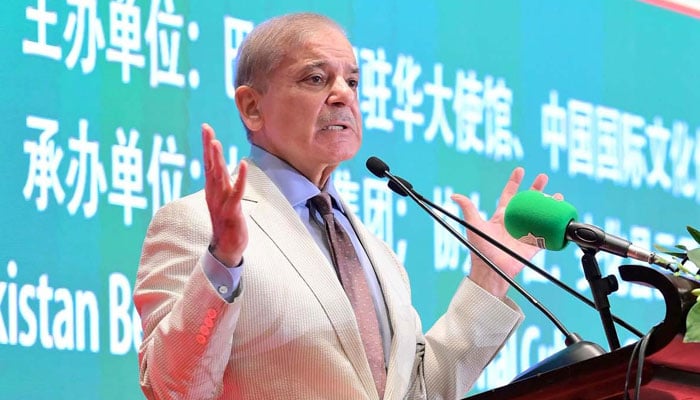Will the PM’s vision lead to action?
We have had four governors-general, 17 presidents, and 23 prime ministers. Since joining the IMF in 1950, Pakistan has had 24 IMF arrangements. Coincidentally, the 24th prime minister of Pakistan is the first in our history to lay the foundation of a ‘Homegrown Economic Plan’. Three questions: Why did it take us 74 years to understand that the IMF’s core mandate is to ‘promote international monetary cooperation’? Why did it take us 23 prime ministers to realize what is clearly spelled out in the IMF’s Articles of Agreement? Why did it take us 23 prime ministers to realize that the responsibility to reform and restructure directly falls on a ‘Homegrown Economic Plan’?
Tanzania’s Ministry of Finance went through 14 IMF arrangements before realizing the need to shift its focus to a ‘homegrown plan’. This led to the development of the ‘Mkukuta’ strategy, which emphasized self-reliance, agricultural development, and poverty reduction. The homegrown approach was presented to the IMF and implemented successfully.
Similarly, Rwanda’s Ministry of Finance and Economic Planning underwent 13 IMF arrangements before recognizing the necessity of focusing on a ‘homegrown plan’. Rwanda developed the ‘Vision 2020’ strategy, which centered on private sector-led growth and a market-oriented agricultural sector. This homegrown approach was presented to the IMF and implemented successfully.
The Vietnamese are fast learners. Vietnam’s Ministry of Finance went through only three IMF arrangements before realizing the need to shift its focus to a ‘homegrown plan’. This led to the development of ‘Doi Moi’ or ‘Renovations’. Imagine, Doi Moi was launched at the Sixth National Congress of the Communist Party of Vietnam. Doi Moi focused on three main objectives: transitioning from central planning to market mechanisms, privatizing SOEs and trade liberalization. Imagine: as a consequence of Doi Moi, direct foreign inflows soared from a billion dollars to $18 billion in 2022. Will Prime Minister Shehbaz Sharif's vision become a plan? Most probably. The real question is whether the plan will be implemented. Here are three crucial factors that will determine the success or failure of Pakistan's Homegrown Economic Plan: Implementation and execution, political stability and business environment.
A well-designed homegrown plan is only as good as its execution. The government's ability to effectively implement the plan's policies and allocate resources efficiently will be critical. This includes overcoming bureaucratic hurdles and building public trust.
To be certain, economic reforms require tough decisions that will be unpopular. And without political stability, the government will struggle to see the homegrown plan through potentially succumbing to short-term political pressures that could derail long-term goals.
Yes, the homegrown plans’ success hinges on creating a business-friendly environment. And creating a business-friendly environment involves three key actions: streamlining regulations, reducing red tape, and encouraging competition. For Pakistan, a window of opportunity has opened to transform its economic landscape through a homegrown plan. The lessons from Tanzania, Rwanda, and Vietnam underscore the importance of self-reliance. We must now forge a path that not only envisions change but also executes it with determination, political stability, and a supportive business environment. The success of this plan could finally set Pakistan on a sustainable course for growth and prosperity.
The writer is a columnist based in Islamabad. He tweets/posts @saleemfarrukh and can be reached at: farrukh15@hotmail.com
-
 It's A Boy! Luke Combs, Wife Nicole Welcome Third Child
It's A Boy! Luke Combs, Wife Nicole Welcome Third Child -
 Leading Astrophysicist Shot Dead At Southern California Home
Leading Astrophysicist Shot Dead At Southern California Home -
 Johnny Depp's Kind Gesture Towards Late 'Grey's Anatomy' Actor Eric Dane Before Death Laid Bare
Johnny Depp's Kind Gesture Towards Late 'Grey's Anatomy' Actor Eric Dane Before Death Laid Bare -
 How Princess Eugenie, Beatrice React To Andrew Arrest?
How Princess Eugenie, Beatrice React To Andrew Arrest? -
 Kylie Jenner 'convinced' Gwyneth Paltrow Is 'crushing' On Timothee Chalamet: 'It's Disrespectful'
Kylie Jenner 'convinced' Gwyneth Paltrow Is 'crushing' On Timothee Chalamet: 'It's Disrespectful' -
 Jemma Chan Reflects On 'difficult Subject Matter' Portrayed In 'Josephine'
Jemma Chan Reflects On 'difficult Subject Matter' Portrayed In 'Josephine' -
 Blood Falls In Antarctica? What Causes The Mysterious Red Waterfall Hidden In Ice
Blood Falls In Antarctica? What Causes The Mysterious Red Waterfall Hidden In Ice -
 AI Power Play: Nvidia Moves To Invest $30 Billion In OpenAI
AI Power Play: Nvidia Moves To Invest $30 Billion In OpenAI -
 Will Savannah Guthrie Ever Return To 'Today' Show? Here's What Insiders Predict
Will Savannah Guthrie Ever Return To 'Today' Show? Here's What Insiders Predict -
 Andrew Mountbatten-Windsor In A Fix Over New Disturbing TMZ Photos
Andrew Mountbatten-Windsor In A Fix Over New Disturbing TMZ Photos -
 Eric Dane Opened Up About Releasing His Memoir Just Two Months Before His Death Due To ALS Complications
Eric Dane Opened Up About Releasing His Memoir Just Two Months Before His Death Due To ALS Complications -
 Zendaya, Tom Holland Already Married? Actress Shows Off New Ring
Zendaya, Tom Holland Already Married? Actress Shows Off New Ring -
 King Charles Holds Emergency Meeting After Andrew Arrest: 'Abdication Is Not Happening'
King Charles Holds Emergency Meeting After Andrew Arrest: 'Abdication Is Not Happening' -
 Amazon Can Be Sued Over Sodium Nitrite Suicide Cases, US Court Rules
Amazon Can Be Sued Over Sodium Nitrite Suicide Cases, US Court Rules -
 'Vikings' Star Mourns Eric Dane's Death
'Vikings' Star Mourns Eric Dane's Death -
 Patrick Dempsey Reveals Eric Dane's Condition In Final Days Before Death
Patrick Dempsey Reveals Eric Dane's Condition In Final Days Before Death




